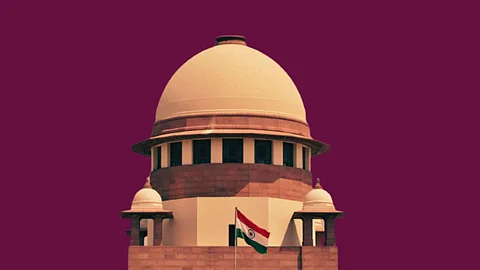

THE SUPREME COURT ON THURSDAY, for the third day in a row, while hearing the Presidential Reference, reiterated that a Governor cannot indefinitely sit over a Bill passed by a state legislature.
It was pointed to the Court that the Governor is not a “super Chief Minister” empowered to withhold even a money Bill, but only a titular head, described as an “ornamental” constitutional functionary acting as a “lubricator and facilitator” in the administration of the State.
Heading a five-judge Constitution Bench comprising Justices Surya Kant, Vikram Nath, Pamidighantam Sri Narasimha and Atul S. Chandurkar, Chief Justice B.R. Gavai observed, “We will not use the words the two-judge bench used, but the Governor would not be justified in sitting over the Bill for six months.”
The remark was an indirect reference to the April 8 judgment of Justices J.B. Pardiwala and R. Mahadevan, who had employed the term “pocket veto” while laying down timelines for Governors and the President to decide on Bills presented for assent.
Senior Advocate Abhishek Manu Singhvi, appearing for Tamil Nadu, opposed the Presidential Reference. He contended that once a Bill is presented to the Governor, he has only three options under Article 200—either to give assent, return it with a message for reconsideration, or reserve it for the President. The argument that a Governor may indefinitely withhold a Bill, he argued, was misconstrued and runs contrary to the scheme of Article 200.
Sighvi argued that hypothetical doomsday scenarios have been presented to justify such a non-existent power of the Governor. To accept such a position will “make a mockery of the whole provision (Article 200).”
Citing the Constituent Assembly debates, Singhvi recalled that Dr. B.R. Ambedkar had characterised the Governor’s office as that of an “ornamental” head.
Rejecting the contention that judicial intervention is barred in cases where Governors fail to act on the Bills presented to him for assent, Singhvi argued that while the Governor forms part of the legislative process, he is neither a legislator nor part of the legislature. He placed strong reliance on the Supreme Court’s previous decisions in Shamsher Singh (1974), Nabam Rebia (2016), and the Constituent Assembly’s deliberations to buttress his submissions.
The Constitution Bench is examining the Presidential Reference of May 15, 2025, which raises the issue of whether the judiciary exceeded its jurisdiction in prescribing timelines for Governors and the President to act on Bills, and whether the concept of “deemed assent” undermines the doctrine of separation of powers.
The Union government has supported the Reference, contending that the Court’s earlier intervention intruded upon the executive’s constitutional domain. The Reference has also been backed by several BJP ruled States.
However, the States of Tamil Nadu and Kerala have questioned the maintainability of the Reference under Article 143. Kerala has argued that such advisory jurisdiction can only be invoked on issues that remain unsettled in law. Since the powers of Governors and the President under Articles 200 and 201 have already been interpreted by the Court, Kerala maintained that the present Reference is legally untenable.